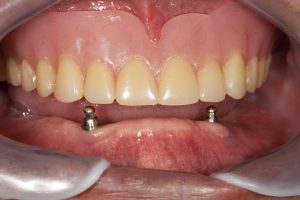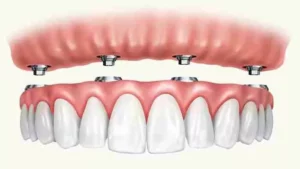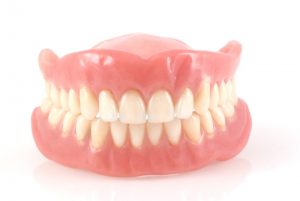
Choosing between implants vs dentures for fixing teeth is a significant decision. This decision has a direct impact on oral health, the ability to use your mouth effectively, and overall quality of life.
Both options serve to replace missing teeth, but they differ significantly in procedure, durability, comfort, and aesthetics.
In this article, we compare implants vs dentures to help you choose the best option for your needs.
Implants: A Solid Foundation for Dental Restoration
Pros:
- Longevity and Durability: Dental implants are renowned for their exceptional durability. Made from biocompatible materials like titanium, implants fuse with the jawbone through a process called osseointegration. This integration ensures a stable and permanent foundation for the replacement tooth, often lasting a lifetime with proper care. You can use implants for a tooth or multiple teeth and even all the teeth.
- Natural Appearance and Functionality: Implants mimic the look and feel of natural teeth. The artificial tooth placed on the implant is custom-designed crown to match the surrounding teeth in shape, color, and size. This seamless integration not only enhances aesthetics but also restores proper biting and chewing functionality.
- Preservation of Jawbone: Unlike dentures implants stimulate the jawbone just like natural tooth roots. This stimulation prevents bone resorption, maintaining the structural integrity of the jaw and facial features. Some types of dentures can cause bone loss over time.
- Enhanced Confidence: Implants provide a high level of confidence as they are securely anchored in the jaw. This eliminates concerns associated with dentures, such as slipping or clicking. For those considering dental implants Rockville MD, this option allows individuals to eat, speak, and smile without worrying about their restoration coming loose.
Cons:
- Surgical Procedure: The implant placement requires a minor surgical procedure, involving the insertion of the implant into the jawbone. While modern techniques have made this process relatively comfortable, some individuals may experience temporary discomfort or swelling.
- Cost Considerations: Implants tend to be more expensive upfront compared to dentures. The cost includes the surgical procedure, materials, and crown placement. However, considering their longevity and benefits, implants can be a cost-effective long-term solution.
Implants vs Dentures – Advantage Implants
In general implants are the best alternative to dentures.
Even for those with gum disease, implant supported dentures or bridges are more natural looking, more natural feeling. Additionally they will give you the confidence to laugh, eat and talk without falling out like complete dentures.
Dentures: Traditional and Time-Tested Solutions
Pros:
- Affordable: Dentures are often more budget-friendly upfront compared to implants. They don’t require surgical procedures or implant placement, making them a suitable option for individuals with budget constraints.
- Non-Invasive: Dentures are non-invasive and don’t require surgery, unless teeth need to be taken out. This can be appealing for individuals who are not comfortable with surgery or have certain health conditions.
- Adaptable: Dentures are suitable for individuals with varying degrees of tooth loss and can be easily adjusted. You can use them to replace a few teeth (partial dentures) or an entire arch (full dentures). Existing teeth can support their construction.
Cons:
- Stability and Comfort: One of the main drawbacks of dentures is their stability. Dentures are less secure than implants and may move while eating or talking, causing discomfort and possible embarrassment.
- Bone Resorption: Dentures do not provide the same level of jawbone stimulation as implants. This lack of stimulation can result in bone resorption over time, altering facial structure and potentially requiring adjustments to the dentures.
- Maintenance and Replacement: Dentures require regular removal for cleaning, and adhesives are often necessary to keep them in place. Dentures may need to be relined or replaced every few years because of wear and changes in the mouth.
- Aesthetics and Functionality: While modern dentures have improved in terms of aesthetics, they may not fully replicate the natural look and functionality of implants. Chewing efficiency and speaking clarity can still be compromised to some extent.
Making an Informed Choice: Implants vs Dentures
Choosing between implants vs dentures is complicated, considering budget, health, preferences, and long-term goals. Dentures and dental implants serve the same purpose to replace missing teeth.
Implants offer a sturdy and lifelike solution, ideal for those seeking maximum functionality and aesthetics. On the other hand, dentures provide a more affordable and adaptable option, albeit with potential comfort and stability trade-offs.
Implants or dentures can improve your smile, boost your confidence, and enhance your quality of life.
Consulting with a qualified dentist is crucial to determine the most suitable option for your specific needs. Factors like oral health, bone density, and overall medical condition should guide your decision.


